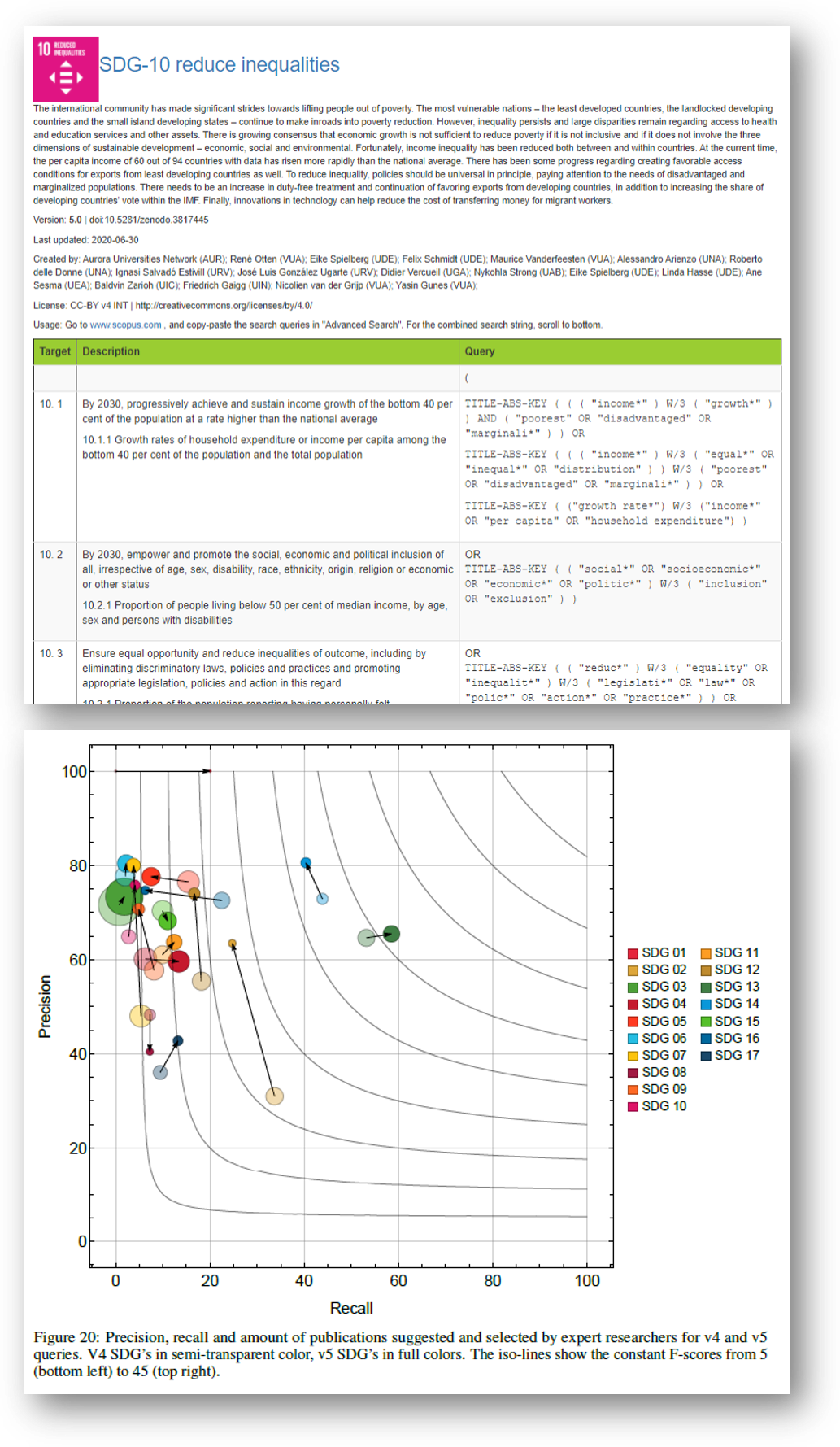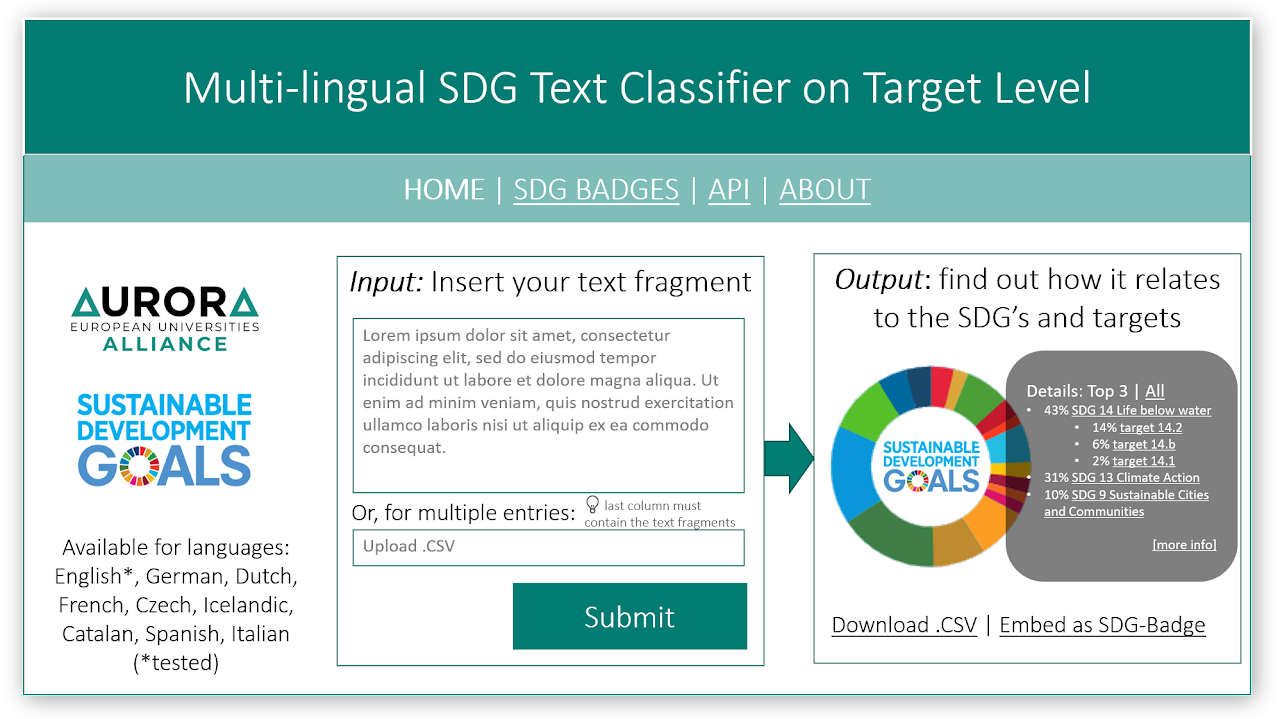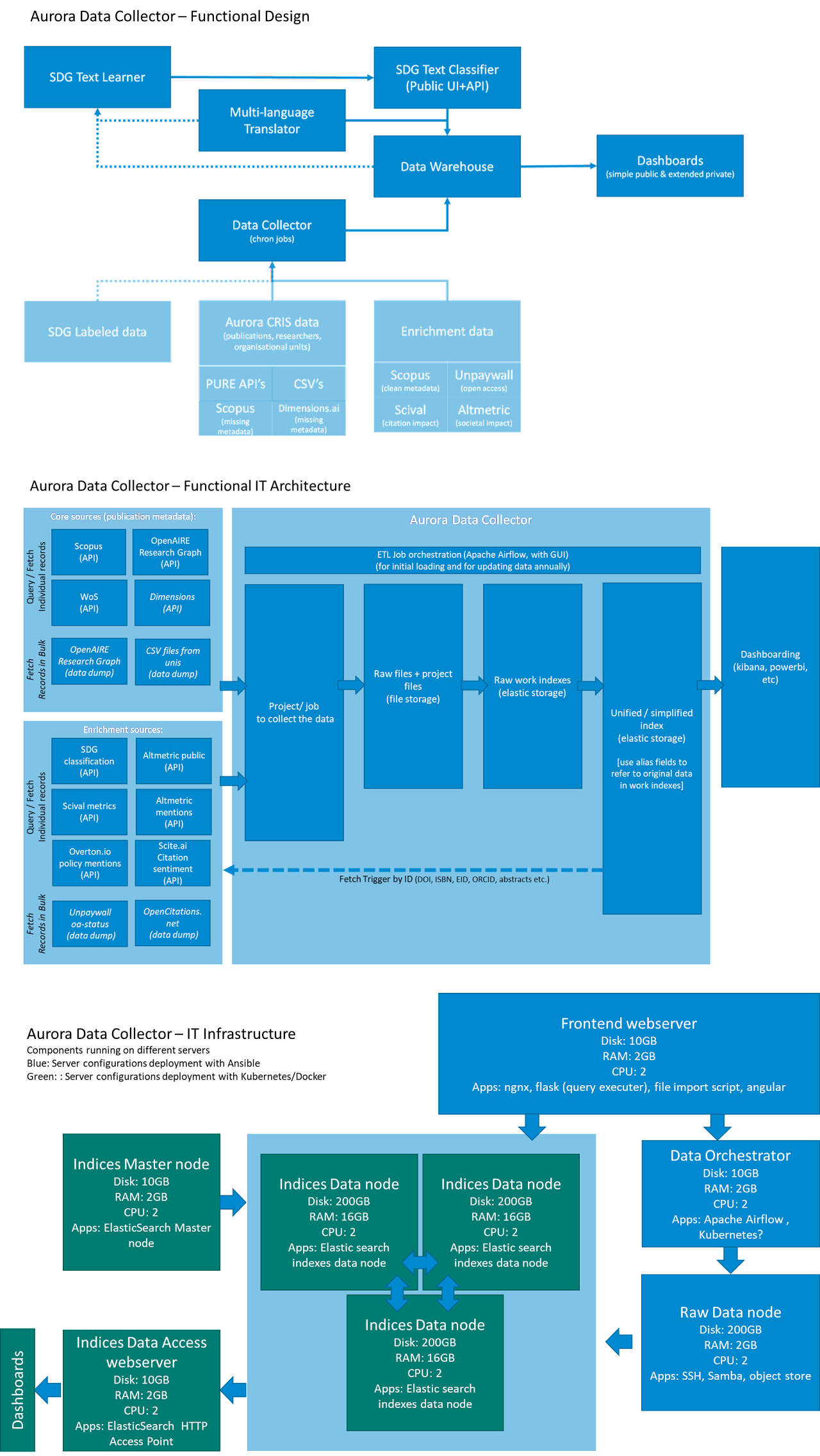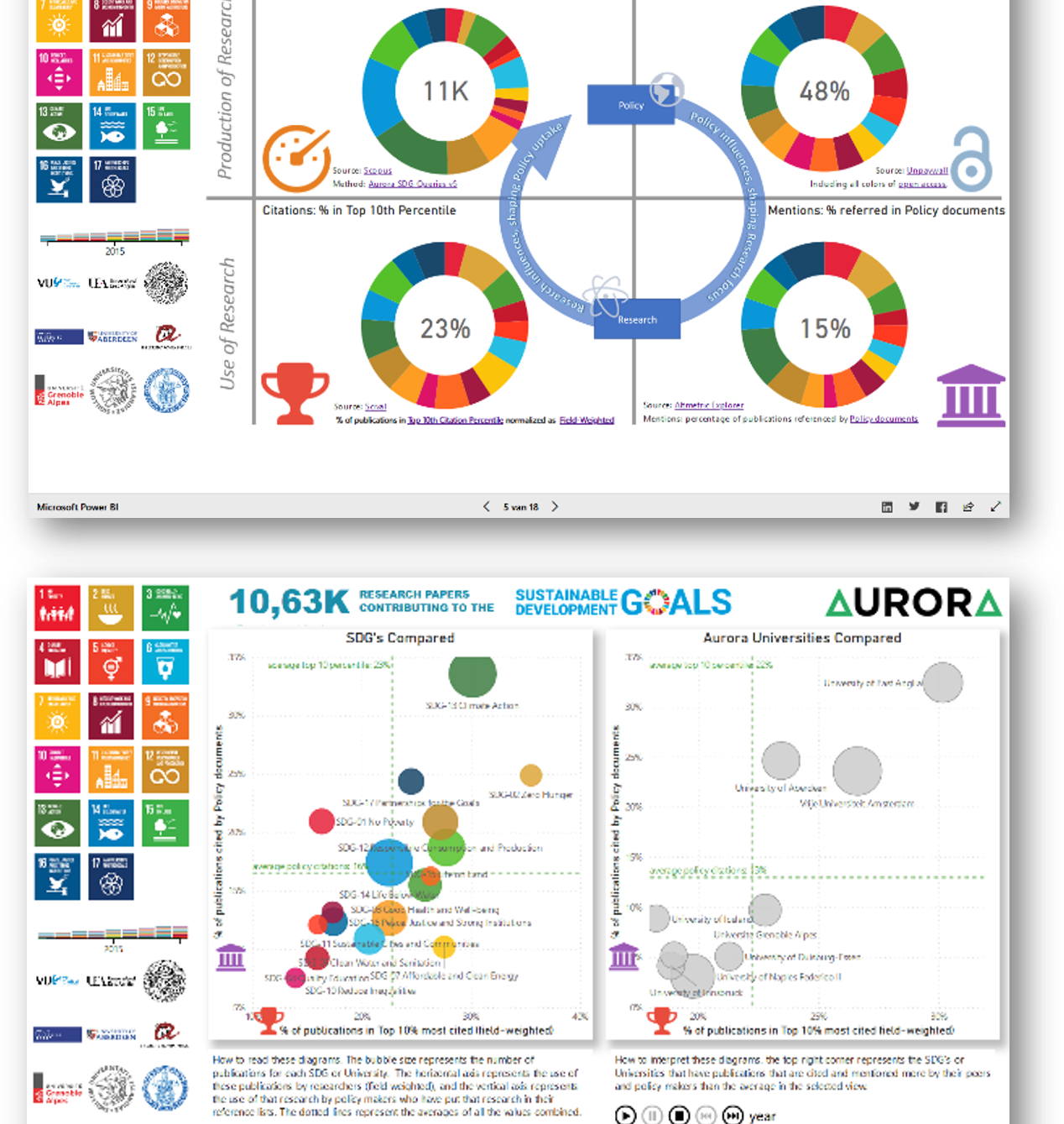Project deliverables: reports, data and code
Below you’ll find all the information about the deliverables of this project, open and freely available.
Our aim is to build a SDG research dashboard that demonstrates the societal relevance and societal impact of research of Aurora Universities. This dashboard shows the research contributions in these societal challenges, and how policymakers have used the research available to tackle these challenges. To reach that goal we want to upgrade the previously build SDG Dashboard to over come issues on completeness and research written in multiple languages.
The steps involved are depicted in the timeline below.


[1] Aurora SDG classification model Query Language robustness evaluation
Status: Finished
For this deliverable we have created a SDG classification model based on a query language (ASCM-QL), using keywords and advanced Boolean operators to search for research output that relate to each of the targets within the SDG’s. This has been done in consultation with the Aurora research community.
Using human feedback of 244 senior researchers, we were able to evaluate the accuracy of the ASCM-QL. The outcomes of the report must be taken into consideration when the results are used for strategic decision making.
Average Precision of all SDG’s is 70% (70% of the publications found in the SDG result sets, are related to that SDG, according to the respondents.)
Average Recall of all SDG’s is 14% (14% of the publications researchers suggested that should be in the SDG result set in the survey, did appear in the SDG result set.)
SDG Queries:
-
Vanderfeesten, Maurice, Otten, René, & Spielberg, Eike. (2020). Search Queries for “Mapping Research Output to the Sustainable Development Goals (SDGs)” v5.0.2 (5.0.2). Zenodo. https://doi.org/10.5281/zenodo.3817444
-
Human readable: WEB PAGE: Aurora SDG Queries
-
Version controlled: https://github.com/Aurora-Network-Global/sdg-queries
-
Evaluation Data:
-
Vanderfeesten, Maurice, Spielberg, Eike, & Gunes, Yassin. (2020). Survey data of “Mapping Research Output to the Sustainable Development Goals (SDGs)“ (1.0.1) [Data set]. Zenodo. https://doi.org/10.5281/zenodo.3813230
-
Vanderfeesten, Maurice, Spielberg, Eike, & Hasse, Linda. (2020). Text Analyses of Survey Data on “Mapping Research Output to the Sustainable Development Goals (SDGs)” (1.0) [Data set]. Zenodo. https://doi.org/10.5281/zenodo.3832090
-
Vanderfeesten, Maurice. (2021). DOI’s with SDG labels on Target level | 1.4M research articles (2009-2020) related to Sustainable Development Goals (1.1) [Data set]. Zenodo. https://doi.org/10.5281/zenodo.5224005
Evaluation Report:
-
Schmidt, Felix, & Vanderfeesten, Maurice. (2021). Evaluation on accuracy of mapping science to the United Nations’ Sustainable Development Goals (SDGs) of the Aurora SDG queries (v1.0.2). Zenodo. https://doi.org/10.5281/zenodo.4917107
-
Human readable: DOWNLOAD PDF
-
Version controlled: https://github.com/Aurora-Network-Global/sdg-queries-evaluation-report

[2] Aurora SDG classification model Machine Learning Multi-lingual Text Classifier
Status: Finished
In order to classify research output written in multiple European languages, and to be independent of the use of query language specifics from research index databases, and to get more relevant research papers that would have been left out using keywords; we aim to migrate the query language based model to a machine learning model processed with a state-of-art multi-language model.
Software
-
Code: the code that training the SDG text classifier model, and predicting texts to relate to the SDG’s can be found here:
Models
-
Binary: the trained 169 models on SDG-Target level can be found here (2GB each):
-
Jaworek, Robert, & Vanderfeesten, Maurice. (2021). AI for mapping multi-lingual academic papers to the United Nations’ Sustainable Development Goals (SDGs). Zenodo. https://doi.org/10.5281/zenodo.5603019
-
-
Binary: re-trained multi-language model, based on Elsevier SDG 2022 definitions data
-
Jaworek, Robert. (2022). SDGs multiclass classifier. Zenodo. https://doi.org/10.5281/zenodo.7095784
-
Publication:
-
Publication: explaining the model architecture, the data flow, the data used to train the model and the evaluation scores of the trained model for English language and other EU languages:
-
Jaworek, Robert, & Vanderfeesten, Maurice. (2021). AI for mapping multi-lingual academic papers to the United Nations’ Sustainable Development Goals (SDGs). Zenodo. https://doi.org/10.5281/zenodo.5603019
-

[3] Aurora SDG classification service
Status: Finished
We have put the trained model in a web service to classify our own papers, and will make this service available for public use based on FAIR use policy.
The web service will contain two parts, an API for developers, and a browser-friendly user interface (UI).
The API will process a text fragment, and return data; the confidence percentages of the text fragment to the SDG goals, and a link to an image one can use as an SDG-badge.
The UI offers a webform to enter a text fragment, or to upload a table. Using a text fragment the UI will show a diagram to what extent this text fragment relates to each SDG goal.
Service:
-
Public access: you can find the SDG text classification service here:
Software:
-
Code: you can find the code to build the SDG text classification service here:
Publication:
-
User Documentation: a guide how to use the SDG text classification service and integrate SDG-badges to your website can be found here:

[4] Aurora SDG classified research output
Status: Finished
Once we have the SDG text classifier up and running, we need to label all research output from aurora universities to the SDG goals and SDG targets.
To help with this task we have to build a data collection and orchestration infrastructure that enables us to automatically collect, categorize and enrich publications with research & societal impact data from a multitude of sources and formats. This then will be unified and offered as an API data access point.
Data:
-
Collected from universities in separate files:
-
Maurice Vanderfeesten, Eike Spielberg, & Max Paulus. (2022). Aurora Publications 2022 | 700.000+ records | Enriched with data measuring Societal Relevance, Societal Impact and Scientific Impact, using SDG’s, Unpaywall, Altmetric, Scite and Scival (1.0) [Data set]. Zenodo. https://doi.org/10.5281/zenodo.6644947
-
-
Harvested from University CRIS systems:
-
Manghi, Paolo, Atzori, Claudio, Bardi, Alessia, Baglioni, Miriam, Schirrwagen, Jochen, Dimitropoulos, Harry, La Bruzzo, Sandro, Foufoulas, Ioannis, Mannocci, Andrea, Horst, Marek, Czerniak, Andreas, Kiatropoulou, Katerina, Kokogiannaki, Argiro, De Bonis, Michele, Artini, Michele, Ottonello, Enrico, Lempesis, Antonis, Ioannidis, Alexandros, & Summan, Friedrich. (2022). OpenAIRE Research Graph: Dumps for research communities and initiatives (latest) [Data set]. Zenodo. https://doi.org/10.5281/zenodo.3974604
-
Download: Aurora_Universities_Network.tar
-
Data Collection Service:
Instead of building your own data collection service, we make use of OpenAIRE to harvest the metadata from our Repositories, CRIS systems and all publications affiliated to our Universities.
-
Aurora Gateway (OpenAIRE Connect): https://aurora.openaire.eu/
Software:
-
No-Code KNIME dataworkflow for combining all separate files.
- Vanderfeesten, Maurice. (2022). Aurora SDG Research Dashboard – including Build-Your-Own guide (8.0). Zenodo. https://doi.org/10.5281/zenodo.7274400
- download .zip and extract .knwf file (knime workflow file)
- or directly (if still available) https://drive.google.com/drive/folders/1IKV771yPA3dRdn_su2Yf24c22hBjCcRu?usp=sharing
- Vanderfeesten, Maurice. (2022). Aurora SDG Research Dashboard – including Build-Your-Own guide (8.0). Zenodo. https://doi.org/10.5281/zenodo.7274400
-
Python Scripts for Enriching data with data from Altmetric, Unpaywall and Scite:

[5] Aurora SDG research dashboard
Status: Finished
Once we have the enriched data, we want to visualise the data. Users will help us with the design process of the visual interactive reports they use in their daily work.
Service:
-
Public Access you can find the Public version of the SDG research dashboard here:
-
as PowerBi Dashboard (static, fully enriched, updated 1x a year): http://bit.ly/aurora-sdg-dashboard-v8
-
as OpenAIRE Monitor: (dynamic, basic, updated 4x a year): https://monitor.openaire.eu/dashboard/aurora/impact
-
Input for OpenAIRE: Aurora indicators for SDG’s in OpenAIRE Monitor
-
-
Software:
-
Binary (stand-alone): you can find the files to run and build your stand-alone version of the SDG research dashboard yourself here:
-
Vanderfeesten, Maurice. (2022). Aurora SDG Research Dashboard – including Build-Your-Own guide (8.0). Zenodo. https://doi.org/10.5281/zenodo.7274400
-
Publication:
-
User feedback: a report on what stakeholder groups need what kind of information to use the SDG-related research output for making societal impact.
-
User documentation: a guide on how to use the SDG dashboard can be found here (in progress):
-
Vanderfeesten, M., & Najarro García, M. (2023). Aurora SDG Research Dashboard and Classifier – User Guides (v1.0). Aurora Universities. https://doi.org/10.5281/zenodo.10040525
-
Developer documentation: a guide on how to deploy and run the SDG dashboard can be found here:
-
Vanderfeesten, Maurice. (2022). Aurora SDG Research Dashboard – including Build-Your-Own guide (8.0). Zenodo. https://doi.org/10.5281/zenodo.7274400
-

[6] Guest Alliances and Universities
Status: Finished
Other EU University alliances are invited to use and re-use the services and software mentioned above.
- Communication and Dissemination plan, including Letter that has been sent:
- Vanderfeesten, M. (2023). Aurora SDG Research Dashboard and Classifier – Communication and Dissemination Plan and Material (v1.0). Aurora Universities. https://doi.org/10.5281/zenodo.10040762
- Presentations given can be found here:
- Vanderfeesten, Maurice. (2022, November 24). Presentations about the Project Aurora SDG Research Dashboard. Zenodo. https://doi.org/10.5281/zenodo.7335160

[7] Bibliometrics Expert & Support Centre
Status: Finished
We have set up a support center to answer questions of the aurora members and guest alliances on how to use the services and software mentioned above.
Services:
-
Contact form to reach the Bibliometrics Expert & Support Centre can be found here:
-
FAQ & SDG Knowledge Base: containing all the other SDG mapping initiatives, services, and literature can be found here:
- SDG AI Experts Network: During the project we met a lot of people working on similar SDG-text-matching techniques and evaluation methods. With the Global Goals Directory we setup this network tot sustain after the end of this project.
About us
Aurora is a partnership of like-minded and closely collaborating research‑intensive European universities, who use their academic excellence to drive societal change.

Co-funded by the Erasmus+ Programme of the European Union

This project has received funding from the European Union´s Horizon 2020 research and innovation programme under grant agreement No 101035804
© Aurora European Universities | map by Leaflet, © OpenStreetMap contributors, © CARTO | admin | email template.